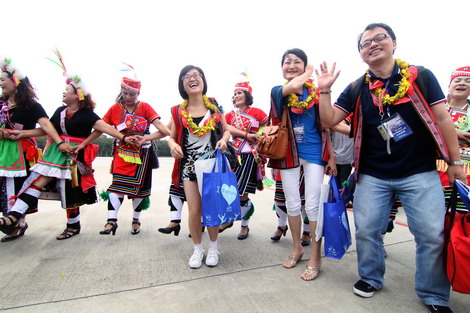 |
|
|
|
|||||||||||
|
 Mainland tourists from Xiamen, Fujian province, are greeted with dances from Taiwan indigenous people at the Taichung Ching Chuan Kang Airport on the island in June. [Photo/ for China Daily] |
Residents of 10 more cities will be able to travel individually to island
The number of mainland tourists to Taiwan is expected to increase significantly as residents of 10 more cities on the mainland will be allowed to travel to the island individually, a senior official said on Wednesday in Beijing.
"We believe that after making adequate preparations, the number of Taiwan-bound individual tourists from 10 more mainland cities will see a large increase," Fan Liqing, spokeswoman of the State Council Taiwan Affairs Office, said at a news conference.
According to a deal reached between organizations from both sides of the Straits, residents of Tianjin, Chongqing, Nanjing, Hangzhou, Guangzhou and Chengdu will be allowed to visit Taiwan individually starting on April 28, Fan said.
Fan also said the residents of Jinan, Xi'an, Fuzhou and Shenzhen will be permitted to visit Taiwan individually before the end of the year, without disclosing the exact date. She added that tourism authorities in those cities are running against time to carefully organize the trial operation.
Mainland tourists were first allowed to visit Taiwan as individuals in June last year. According to Fan, the pilot program, which started in Beijing, Shanghai and Xiamen, had attracted more than 57,000 tourists from the mainland to Taiwan by the end of March.
Taiwan authorities dropped an overall ban on mainland residents traveling to the island in July 2008. Since then, the island has become a popular destination for mainland tourists - first in the form of group tours, then as individuals.
The mainland is currently a major source of tourism to Taiwan. In 2011, more than 1.78 million mainland residents visited the island, a year-on-year increase of 9.4 percent. Mainland tourists made up nearly one-third of the 6.09 million visitors Taiwan received last year, according to its tourism department.
Ma Yiliang, a researcher on Taiwan's tourism market at the China Tourism Academy, said the 10 cities were added to the list due to regional representation and their large market potential.
"The program will expand the island's inbound tourism, but it will also increase the pressure on the stringent capacity of tourist reception, which was insufficiently expanded in the past decade," Ma said.
But he said the pilot program has been successful, as it has boosted tourism and created more options for visitors from the mainland.
Only three out of every 100,000 visitors from the mainland stay illegally in Taiwan, Ma said. It's a sensitive problem that has been kept under control but drawn concerns from both sides.
According to the rules, individual tourists from the mainland are allowed to travel in Taiwan for up to 15 days. People older than 20 must provide evidence of having at least 50,000 yuan ($7,900) in a bank account or an annual income of 120,000 yuan to get a travel permit to the island.
Although mainland tourists are allowed to make their own itineraries on the island, they are banned from 11 activities such as participating in public events with a political end or entering the military defense areas.
Chen Zhengting, a 29-year-old resident of Fuzhou, capital of Fujian province, said that he would like to travel across the Straits after the tourism program comes into effect, as Fujian and Taiwan are close and share common cultural roots.
"I hope the Taiwan tourism authorities take measures to strengthen travel safety, as several accidents occurred last year injuring mainland tourists," he said.
Fan also said that the mainland welcomes Taiwan's construction of a 5.4-km bridge linking two islands in Kinmen, an archipelago near Xiamen, Fujian, which will encourage more mainland visitors to Taiwan. Construction is scheduled to begin in May.
"We support any effort that will help promote Taiwan's economy and the people's exchanges across the Straits," Fan said.
Last month, Hu Jintao, general secretary of the Communist Party of China Central Committee, and Wu Po-hsiung, honorary chairman of the Kuomintang party, met in Beijing.
Both leaders called on the two sides to enhance relations through more cultural and economic exchanges, which have laid a solid foundation for closer future cross-Straits exchanges since the KMT's victory in the island's leadership election in January.
Contact the writers at tanzongyang@chinadaily.com.cn and humeidong@chinadaily.com.cn